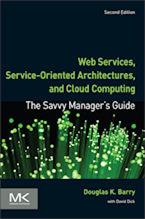WS Choreography Description Language (CDL)
The WS Choreography Definition Language (WS-CDL) is an XML-based language that describes peer-to-peer collaborations of Web Services participants by defining their common and complementary observable behavior; where ordered message exchanges result in accomplishing a common business goal. The Web Services Choreography specification is targeted for composing interoperable peer-to-peer collaborations between any type of Web Service participant regardless of the supporting platform or programming model used by the implementation of the hosting environment.
Technical submissions: Web Services Conversation Language (WSCL) and Web Services Choreography Interface (WSCI)
Also see: WS Choreography Model.
Organization: W3C
More information: Web Services Choreography Working Group page on the W3C website
More Detail on WS Choreography Description Language (CDL)
Context for WS Choreography Description Language (CDL)
Related Articles for WS Choreography Description Language (CDL)
- Business Centric Methodology (BCM)
- Business Process Execution Language (BPEL)
- Business Process Query Language (BPQL)
- Business Process Specification Schema (BPSS)
- Business Transaction Protocol (BTP)
- Collaboration Protocol Profile/Agreement (CPP/A)
- Common Alerting Protocol (CAP)
- Content Assembly Mechanism (CAM)
- Partner Interface Process (PIP)
- RosettaNet Implementation Framework (RNIF)
- Web Services Flow Language (WSFL)
- Wf-XML
- XLANG
Author
Douglas K Barry
Principal
You may use this material for your work or classes. Reprint Policy. Be sure to check the menu at the left for other articles available on this site.
The Savvy Manager's Guide
Douglas K Barry is also the author of a book that explains Web Services, service-oriented architecture, and Cloud Computing in an easy-to-understand, non-technical manner.
Web Services, Service-Oriented Architectures, and Cloud Computing: The Savvy Manager's Guide (Second Edition)
by Douglas K Barry with David Dick
This is a guide for the savvy manager who wants to capitalize on the wave of change that is occurring with Web Services, service-oriented architecture, and—more recently—Cloud Computing. The changes wrought by these technologies will require both a basic grasp of the technologies and an effective way to deal with how these changes will affect the people who build and use the systems in our organizations. This book covers both issues. Managers at all levels of all organizations must be aware of both the changes that we are now seeing and ways to deal with issues created by those changes.

